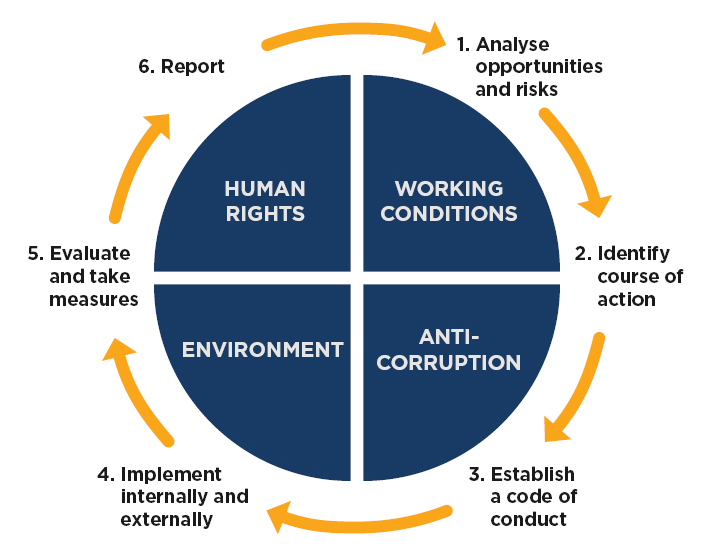A Guide to Sustainable Business

For many companies, sustainability is an obvious necessity and a part of core business, but others feel it is a daunting challenge. This can be rooted in concerns about reduced profit margins, or a need for commitment at management level, or simply a lack of knowledge about sustainability. Whether your company operates globally or is limited to Sweden, sustainability is an important component of your long-term profitability – and a worthwhile investment.
Business Sweden’s definition of sustainability is based on the four areas of the UN Global Compact: human rights, working conditions, anti-corruption and the environment.
Within these four focus areas, companies have a responsibility to avoid and mitigate adverse effects of doing business – regardless of where in the world their operations and business relations are conducted. At the same time, many companies face major challenges in markets where regulations and control mechanisms for protecting human rights and the environment, or inhibiting corruption, are either lacking or absent. In these cases, it is especially important that companies meet international guidelines and standards for sustainable business and avoid the pitfalls and shortcomings of prevailing local practices.
Sweden and Swedish companies have long been at the forefront of the sustainability drive and businesses have contributed to positive social development through their sustainability efforts and programmes in the countries where they are operating. Future-minded business leaders have employed techniques and socially responsible business models whilst taking an active role in opposing corruption, which has made Swedish companies attractive to business partners on the international stage.
The Swedish government commits to sustainable development to reinforce competetiveness
The Swedish Government’s Export Strategy emphasizes the need to increase the international competitiveness of Swedish companies by boosting support for their sustainability efforts abroad. The government has also created a platform for internationally sustainable business, describing what the government is doing within the area and its ambitions for sustainable business.
Further impetus for the government to focus even more on sustainable business dates back to 2015, when world leaders agreed on a common agenda for the elimination of extreme poverty, combating inequalities and injustices in the world, resolution of the climate crisis and the promotion of peace and justice. The initiative became known as Agenda 2030. Individual states shoulder the bulk of the responsibility, but companies play an important role in achieving the goals in the Agenda by the year 2030. All 17 goals of the Agenda 2030 can be linked to the four focus areas for sustainability.
As part of the Government’s efforts, Business Sweden has been commissioned to implement a series of sustainability measures which, among other things, has resulted in this guide to sustainable business practices.
The Guide - a tool for sustainable business
Business Sweden's “Guide to sustainable business” has been put together for all companies that want to jumpstart their sustainability programmes or develop existing efforts. As a useful resource, its objective is to provide inspiration and guidance on sustainable business for both small and medium-sized companies that intend to export goods or services and which have international value chains.

The guide focuses on six steps for success in sustainable business and provides basic knowledge about sustainable business, what it means and how it can be carried out in practice. We highlight specific challenges and risks in the various areas and provide tips for preventive measures. In addition, we turn the spotlight on a selection of inspiring companies that are actively working in at least one of the four focus areas.
